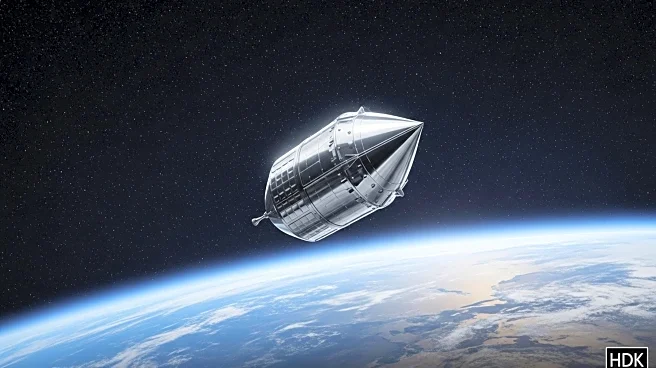What's Happening?
On October 4, 1957, the Soviet Union successfully launched Sputnik 1, the world's first artificial satellite, into space using a repurposed R-7 rocket. Sputnik, measuring 22 inches in diameter and weighing 184 pounds, transmitted a beeping signal that was tracked globally by radio operators. This event marked a significant milestone in the Space Race, as the United States found itself lagging behind in space exploration. The launch of Sputnik not only demonstrated Soviet technological prowess but also raised concerns about their capability to launch ballistic missiles, intensifying Cold War tensions. In response, the U.S. accelerated its space efforts, leading to the creation of NASA and the subsequent race to land on the Moon.
Why It's Important?
The launch of Sputnik by the Soviet Union had profound implications for the United States, both technologically and politically. It highlighted the need for the U.S. to enhance its space capabilities, leading to increased investment in science and technology education and research. The event spurred the U.S. government to establish NASA, which played a crucial role in advancing American space exploration. Additionally, Sputnik's launch intensified the Cold War, as it demonstrated the Soviet Union's potential military capabilities, prompting the U.S. to prioritize national security and defense strategies. This period marked the beginning of a new era in global politics, where space exploration became a critical component of national power.
What's Next?
Following the launch of Sputnik, the United States focused on catching up in the Space Race. This led to the successful launch of Explorer 1, the first American satellite, in January 1958. The U.S. continued to invest heavily in space technology, culminating in the Apollo program and the historic Moon landing in 1969. The competition between the superpowers in space exploration persisted throughout the Cold War, influencing technological advancements and international relations. The legacy of Sputnik continues to impact space policy and exploration efforts globally, as nations strive to achieve new milestones in space technology.
Beyond the Headlines
Sputnik's launch not only marked a technological achievement but also had cultural and educational impacts. It inspired a generation of scientists and engineers, leading to increased interest in STEM fields. The event also highlighted the importance of international collaboration in space exploration, as nations recognized the benefits of sharing knowledge and resources. The Space Race fostered innovation and technological advancements that have had lasting effects on various industries, including telecommunications, computing, and materials science. As space exploration continues to evolve, the lessons learned from Sputnik's launch remain relevant in addressing contemporary challenges in space policy and international cooperation.










